 Back to the Be Inspired Blog
Back to the Be Inspired Blog
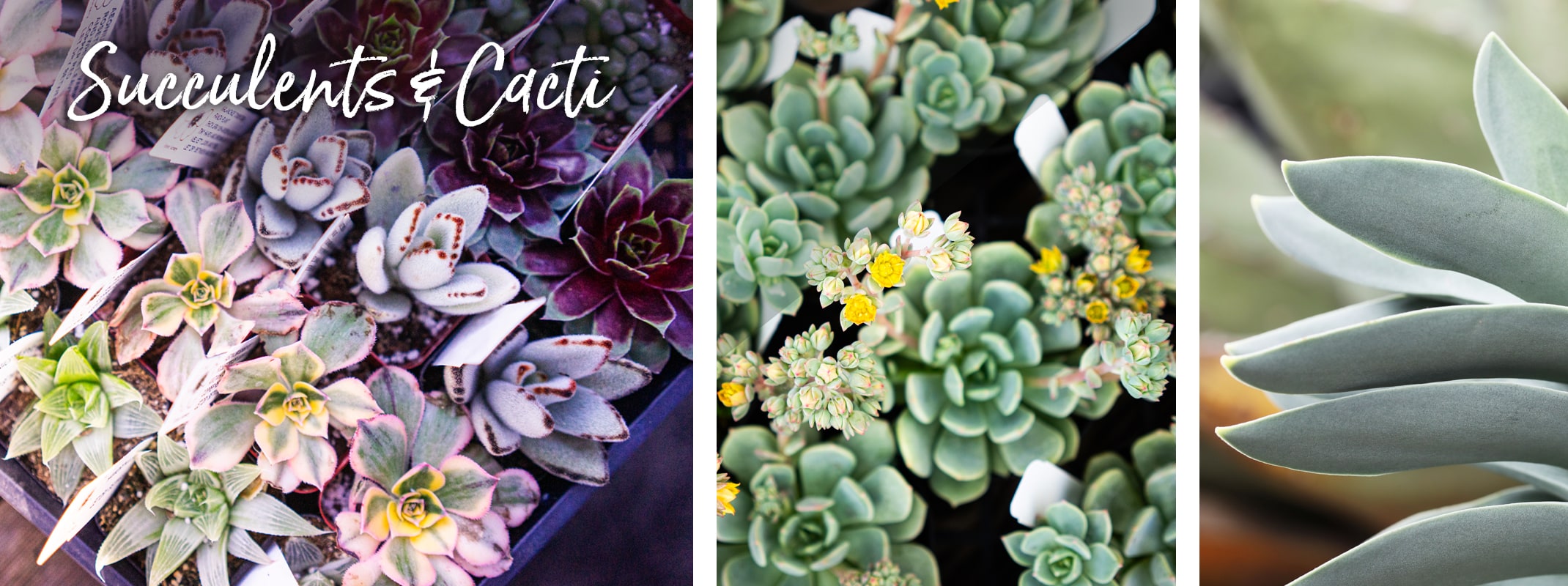
Sustainable Gardening: Top 10 Water-Wise Succulents and Cacti for Bay Area Gardens
Succulents and cacti have long been popular in Bay Area landscapes due to their striking appearance, low water needs, and easy maintenance. With new varieties coming on the scene and the resurgence of long-established varieties, we’ve compiled a list of the top 10 succulents and cacti that will no doubt be standouts in your Bay Area gardens and landscapes. Please Note: Selection may vary by location and season.
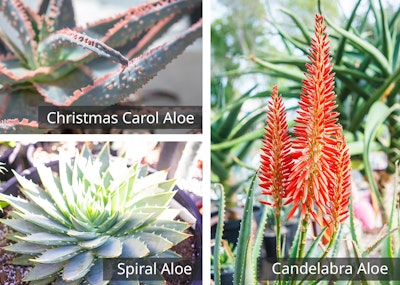 1. Aloe Vera (Aloe barbadensis miller)
1. Aloe Vera (Aloe barbadensis miller)
Known for its medicinal properties and attractive, fleshy leaves, Aloe Vera is a staple for any garden due to its healing properties, drought tolerance, and ease of care.
Care: Prefers bright, indirect sunlight. Water deeply but infrequently, allowing the soil to dry out completely between waterings.
- Varieties:
- Spiral Aloe
- Christmas Carol Aloe
- Candelabra Aloe
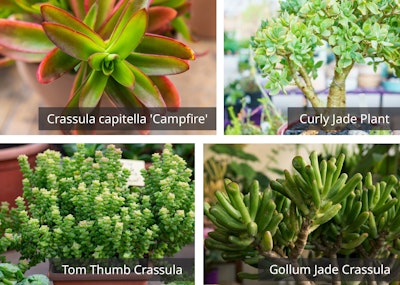 2. Jade Plant (Crassula ovata)
2. Jade Plant (Crassula ovata)
Jade plants have thick, glossy, oval leaves and can be grown as small shrubs or bonsai. Their long-lived and hardy nature, coupled with attractive foliage, makes them ideal for both indoor and outdoor settings.
Care: Requires bright light and well-draining soil. Water when the top inch of soil is dry.
- Varieties:
- Crassula capitella 'Campfire'
- Gollum Jade Crassula
- Tom Thumb Crassula
- Curly Jade Plant Crassula ovata
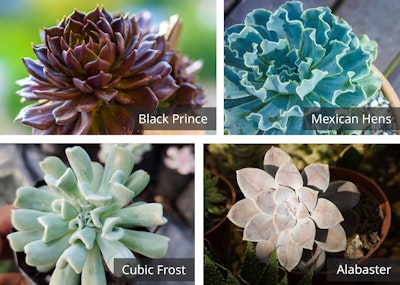 3. Echeveria (Echeveria spp.)
3. Echeveria (Echeveria spp.)
Echeverias form rosettes of fleshy leaves and come in various colors and shapes. Their stunning rosette shapes and variety of colors make them perfect for decorative displays.
Care: Needs full sun to partial shade and well-draining soil. Water sparingly, allowing the soil to dry out between watering.
- Varieties:
- Echeveria 'Party Dress'
- Echeveria 'Black Prince'
- Echeveria 'Cubic Frost'
- Echeveria 'Alabaster Marble – Rosebud'
- Echeveria 'Mexican Hens'
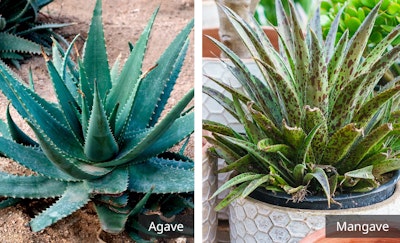 4. Agave (Agave spp.)
4. Agave (Agave spp.)
Agaves have large, spiky leaves and are often used as focal points in landscapes. Their dramatic architectural form and low maintenance needs make them a striking addition.
Care: Thrives in full sun and well-drained soil. Water occasionally, more during hot, dry periods.
- Varieties:
- Mangave (a cross between Agave and Manfreda)
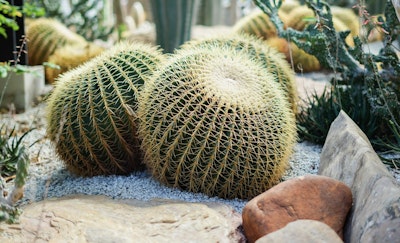 5. Golden Barrel Cactus (Echinocactus grusonii)
5. Golden Barrel Cactus (Echinocactus grusonii)
This round cactus with golden spines adds a unique spherical shape and vibrant spines that create an eye-catching focal point in gardens.
Care: Prefers full sun and sandy, well-drained soil. Water sparingly, especially in winter.
 6. Hens and Chicks (Sempervivum tectorum)
6. Hens and Chicks (Sempervivum tectorum)
Forms rosettes of succulent leaves and produces offsets or "chicks" around the main plant. Their easy propagation and charming rosette clusters make them ideal for ground cover.
Care: Needs full sun and well-drained soil. Water moderately, allowing the soil to dry out between watering.
- Varieties:
- Cobweb Houseleek (Sempervivum arachnoideum)
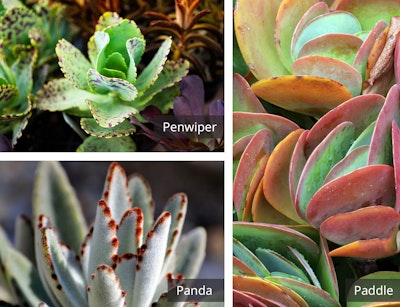 7. Paddle Plant (Kalanchoe thyrsiflora)
7. Paddle Plant (Kalanchoe thyrsiflora)
Known for its large, flat, paddle-shaped leaves that turn red in the sun, this plant adds striking foliage that changes color in the sun for visual interest.
Care: Prefers bright light and well-drained soil. Water when the soil is dry to the touch.
- Varieties:
- Penwiper Plant (Kalanchoe marmorata)
- Panda Plant (Kalanchoe tomentosa)
- Paddle Plant (Kalanchoe thyrsiflora)
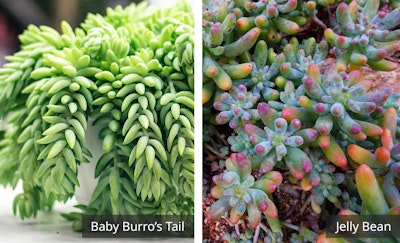 8. Sedum Varieties
8. Sedum Varieties
Sedums are known for their thick, fleshy leaves and often vibrant colors, making them versatile and resilient additions perfect for rock gardens and containers.
Care: Require full sun to partial shade and well-draining soil. Water moderately.
- Varieties:
- Baby Burro’s Tail (Sedum burrito)
- Jelly Bean Stonecrop (Sedum rubrotinctum)
 9. Senecio Varieties
9. Senecio Varieties
This trailing succulent has round, bead-like leaves that cascade beautifully, making them ideal for hanging baskets and vertical gardens with their unique trailing habit.
Care: Requires bright, indirect light and well-draining soil. Water when the top soil is dry, being careful not to overwater.
- Varieties:
- Senecio peregrinus (String of Dolphins)
- Senecio rowleyanus (String of Pearls - Regular and Variegated)
- Senecio herreanus (String of Watermelons or String of Tears)
- Senecio radicans (String of Fishhooks)
- Blue Chalksticks (Senecio serpens)
- Ceropegia woodii (String of Hearts)
- Peperomia prostrata (String of Turtles)
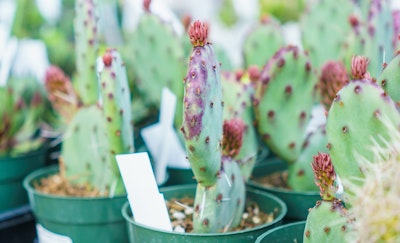 10. Prickly Pear (Opuntia spp.)
10. Prickly Pear (Opuntia spp.)
Known for its flat, paddle-like segments and colorful fruit, this plant’s distinctive paddles and edible fruit add both ornamental and practical value.
Care: Needs full sun and sandy, well-drained soil. Water occasionally, allowing the soil to dry out between watering.
General Care Tips for Succulents and Cacti
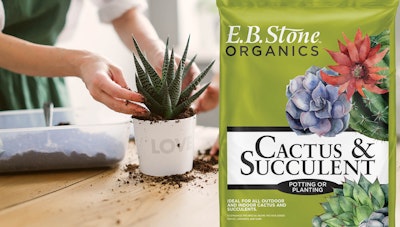 Light: Most succulents and cacti prefer bright, indirect light. Some can tolerate full sun, but be mindful of potential sunburn in extreme heat.
Light: Most succulents and cacti prefer bright, indirect light. Some can tolerate full sun, but be mindful of potential sunburn in extreme heat.- Watering: Water deeply but infrequently. Allow the soil to dry out completely between waterings to prevent root rot.
- Soil: Use well-draining soil, such as a cactus or succulent mix, to prevent waterlogging. We recommend E.B. Stone Cactus & Succulent Mix.
- Fertilization: Feed with a balanced, water-soluble fertilizer diluted to half strength during the growing season.
By incorporating these stunning succulents and cacti into your Bay Area landscape, you can enjoy a vibrant, low-maintenance garden that thrives in the local climate. Visit SummerWinds Nursery to explore our wide selection and get expert advice on caring for your plants.

